I am trying to establish a reliable serial connection between embedded device and Python. Which works fine without termination, if Python code is started at the right moment while the serial port is in idle between messages. But it is not practical especially at high data rates. So I decided to do it right and added a carriage return 'x0D' at the end of the source messages to solve the timing problem. But I'm still not sure how to implement it properly in Python.
Note: Size of each serial message is 17 bytes = 4 sensor values payload and CR.
The required data rate is 2.3kHz, but it starts to become unreliable already at 200Hz:
import serial
import struct
serialPort = 'COM3'
serialBaud = 230400
rawData = bytearray(16)
numSensors = 4
dataNumBytes = 4
data = [0 for x in range(numSensors)]
ser = serial.Serial(serialPort, serialBaud, timeout=1)
ser.reset_input_buffer()
while(True):
rawData = bytearray(ser.read(17).split(b'\x0D')[0])
for i in range(numSensors):
bytedata = rawData[(i * dataNumBytes):(dataNumBytes + i * dataNumBytes)]
data[i], = struct.unpack('f', bytedata)
print(data)
ser.close()
E.g. at a data rate of 200Hz it works after a few attempts, but then throws an error:
\Python\temp> python .\print_data.py
Traceback (most recent call last):
File ".\print_data.py", line 22, in <module>
data[i], = struct.unpack('f', bytedata)
struct.error: unpack requires a buffer of 4 bytes
\Python\temp> python .\print_data.py
Traceback (most recent call last):
File ".\print_data.py", line 22, in <module>
data[i], = struct.unpack('f', bytedata)
struct.error: unpack requires a buffer of 4 bytes
\Python\temp> python .\print_data.py
[-487.5, 0.963982343673706, -0.021746518090367317, -0.26979273557662964]
[0.3199999928474426, 0.963982343673706, -0.02106693759560585, -0.26979273557662964]
[0.30000001192092896, 0.9643221497535706, -0.020047569647431374, -0.2680937945842743]
[0.2800000011920929, 0.9622833728790283, -0.018688412383198738, -0.269113153219223]
[0.0, 0.9626231789588928, -0.01800883375108242, -0.27047231793403625]
Traceback (most recent call last):
File ".\print_data.py", line 22, in <module>
data[i], = struct.unpack('f', bytedata)
struct.error: unpack requires a buffer of 4 bytes
Additionally I have tried with readline without success.
I would like to know what I am doing wrong.
